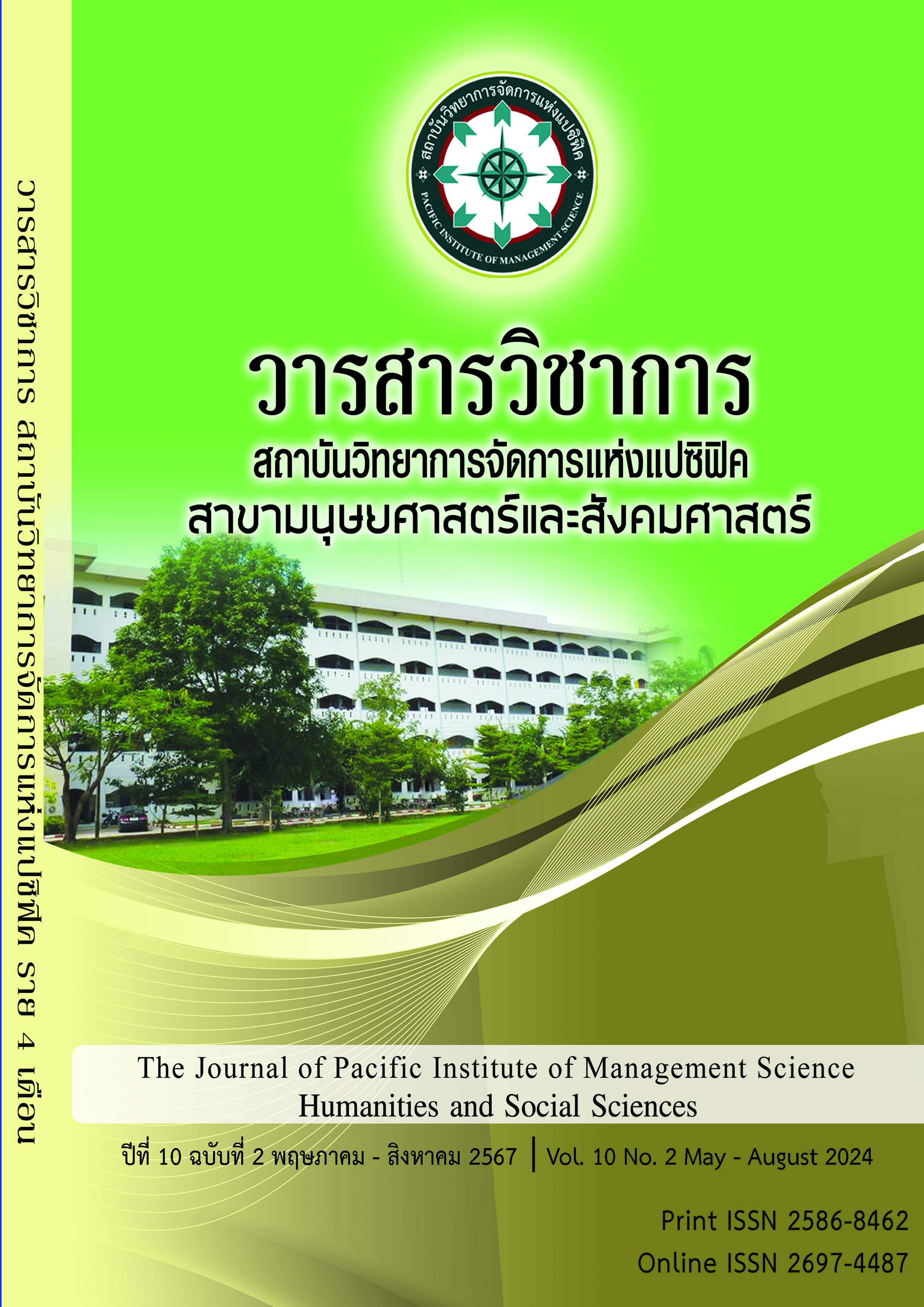Elevating Community's Quality of Life and Income from Local Wisdom: A Case Study of Mueang Phai Subdistrict Wickerwork Group, Sakaew Province
Keywords:
community development, local wisdom, wattle, quality of life development, sufficiency economyAbstract
This study aimed to improve the quality of life and income of the grassroots community in Mueang Phai sub-district by utilizing community participation as a key approach, in addition to promoting local wisdom in basket weaving to develop various community products and generate employment and income. The study sample consisted of residents and community leaders in Mueang Phai sub-district, Aranyaprathet district, Sa Kaeo province. Data collection methods included field surveys, in-depth interviews, focus group discussions, content analysis and descriptive mapping. The results showed that the Mueang Phai community faced problems such as lack of water sources for agriculture, insufficient produce and the need for secondary employment. However, they had potential in the traditional art of weaving. Activities were organized to revive and promote product design using bamboo strips, which were abundant in the area, as the main material for wickerwork. These were further developed into various products such as baskets, containers and lamps. The community also jointly designed a group brand and acquired skills in management, online and offline marketing. Then the Mueang Phai Wickerwork Occupation Group was founded.The members of the group were able to increase their income by an average of 10, improve their mental health, increase their social participation and expand their activities in the community. To strengthen the group, group management training was conducted based on the philosophy of sufficiency economy. This approach emphasized moderation, reason and prudence based on knowledge and virtue. It also focused on strengthening resilience in order to be prepared for change. The study shows how the use of local resources and wisdom, combined with community participation and capacity building, can lead to sustainable economic development and improved quality of life in rural communities.
References
ปรเมษฐ์ สีจันทา และคณะ. (2567). การศึกษาแนวทางการพัฒนาอาชีพการเพาะเห็ดนางฟ้าชุมชนบ้านผือน้อย ตำบลบ้านผือ อำเภอจอมพระ จังหวัดสุรินทร์. วารสารศิลปะและวัฒธรรมลุ่มแม่น้ำมูล, 13(1), 60-61.
องค์การบริหารส่วนตำบลเมืองไผ่. (2557). ข้อมูลเกี่ยวกับตำบลเมืองไผ่, เข้าถึงเมื่อ มกราคม 2567, เข้าถึงได้จาก mueangphai.go.th
แนวคิดเศรษฐกิจชุมชนในประเทศไทย. มหาวิทยาลัยสุโขทัยธรรมมาธิราช, 2555
มูลนิธิชัยพัฒนา. (2550). เศรษฐกิจพอเพียงและทฤษฎีใหม่. สำนักงานมูลนิธิชัยพัฒนา, กรุงเทพมหานคร.
Kumnerd, J. (2011). Developing community for self-reliance. Chiang Mai University.
Mansuri, G., & Rao, V. (2004). Community-based and -driven development: A critical review. The World Bank Research Observer, 19(1), 1-39. https://doi.org/10.1093/wbro/lkh012
Midgley, J. (2014). Social development: Theory and practice. Sage.
Mongsawad, P. (2010). The philosophy of the sufficiency economy: A contribution to the theory of development. Asia-Pacific Development Journal, 17(1), 123-143.
Nuanjun, S., Chanapai, K., & Sandeewong, B. (2021). Weaving with bamboo for community income: A case study of Ban Na Khian community, Mueang District, Kanchanaburi Province. Journal of Humanities and Social Sciences Thonburi University, 15(2), 46-60.
Office of the National Economic and Social Development Council. (2017). The philosophy of sufficiency economy. https://www.nesdc.go.th/ewt_dl_link.php?nid=3779
Petcharat, N., & Pheunpha, W. (2019). Community product development with local wisdom: A case study of Ban Nong Kung Community, Nakhon Luang District, Ayutthaya Province. EAU Heritage Journal Social Science and Humanities, 9(3), 156-166.
Petchmunee, P. (2019). Effects of supplementary occupation and income promotion on the quality of life development of housewives in Nakhon Ratchasima [Unpublished master's thesis]. Srinakharinwirot University.
Rahman, M. S. (2020). Participatory rural development in practice: Insights from Bangladesh. Canadian Journal of Nonprofit and Social Economy Research, 11(2), 36-55. https://doi.org/10.22230/cjnser.2020v11n2a327
Suwannachart, N., & Yindeerat, S. (2021). Development of lifestyle products from local wisdom: A case study of Uthai Thani Province. EAU Heritage Journal Science and Technology, 15(2), 1-14.
Von Borstel, F. (2021). Community development and integrated rural development. In W. Doppler & A. Yousuf (Eds.), Disruptive landscapes: Steps towards a sustainable future (pp. 89-97). Zerzabat Publishing.
Wallace, S.A. (1974). Identifying Quality of Life Indicators for Use in Family Planning Programs in Developing Countries. M.A. Thesis University of Pennsylvania.
Downloads
Published
Issue
Section
License
Copyright (c) 2024 Pacific Institute of Management Science

This work is licensed under a Creative Commons Attribution-NonCommercial-NoDerivatives 4.0 International License.
บทความที่ได้รับการตีพิมพ์เป็นลิขสิทธิ์ของ สถาบันวิทยาการจัดการแห่งแปซิฟิค
ข้อความที่ปรากฏในบทความแต่ละเรื่องในวารสารวิชาการเล่มนี้เป็นความคิดเห็นส่วนตัวของผู้เขียนแต่ละท่านไม่เกี่ยวข้องกับสถาบันวิทยาการจัดการแห่งแปซิฟิค และคณาจารย์ท่านอื่นๆในสถาบันฯ แต่อย่างใด ความรับผิดชอบองค์ประกอบทั้งหมดของบทความแต่ละเรื่องเป็นของผู้เขียนแต่ละท่าน หากมีความผิดพลาดใดๆ ผู้เขียนแต่ละท่านจะรับผิดชอบบทความของตนเองแต่ผู้เดียว







